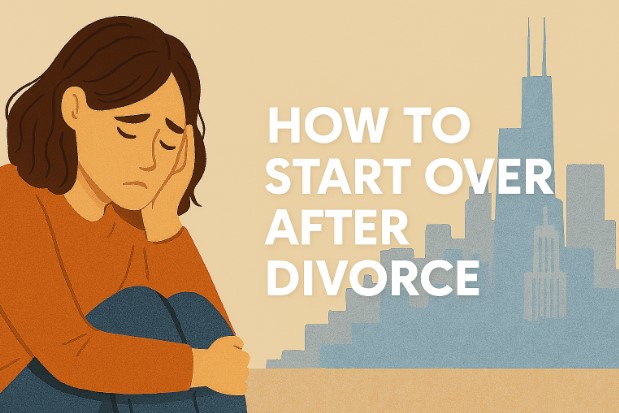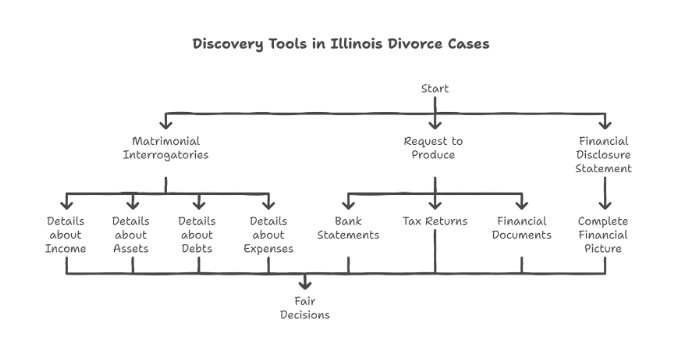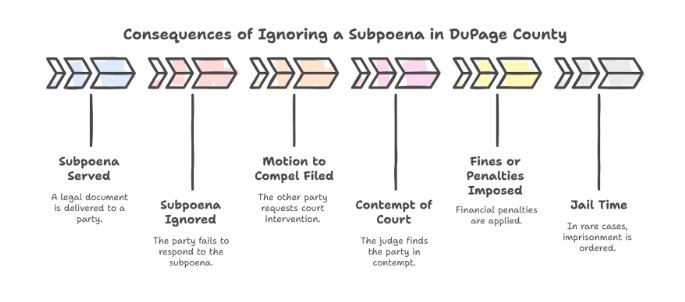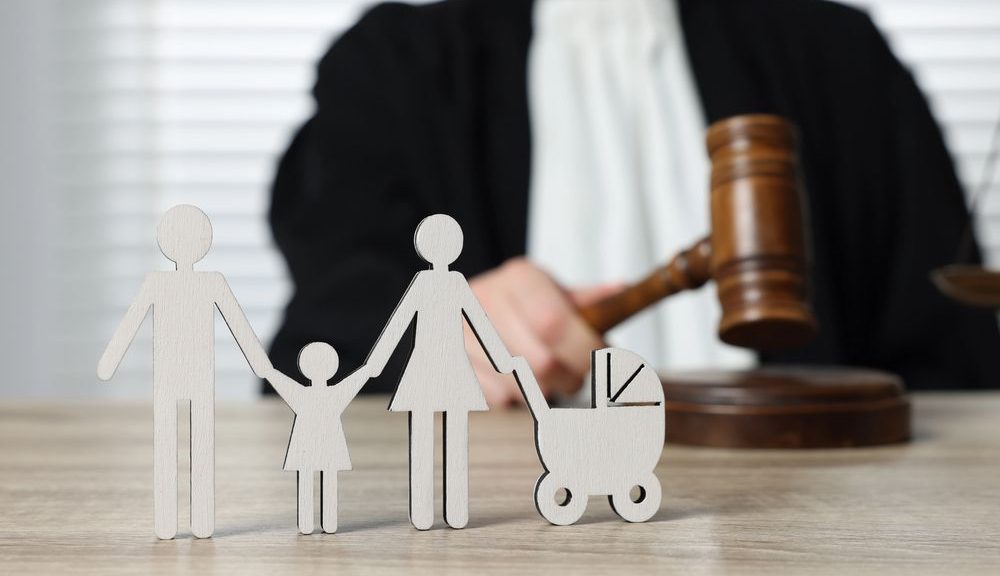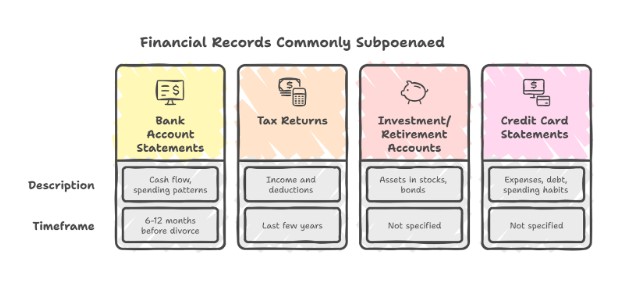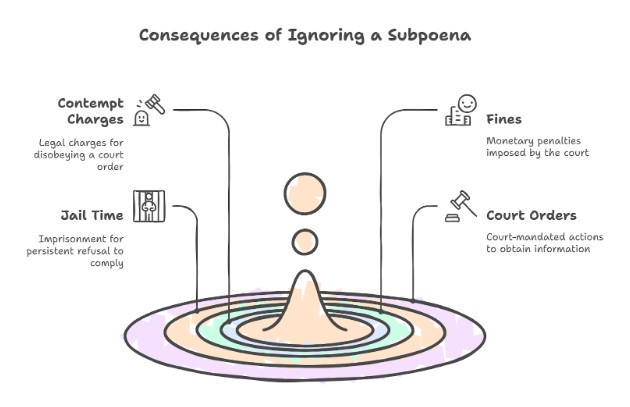You didn’t plan for this. Not the sleepless nights. Not the silence where conversation used to be. Not the ache of trying to keep everything normal—for the kids, for yourself—when nothing feels normal at all.
Divorce doesn’t just end a relationship. It reshapes your life in ways you never expected. Your home feels different. Your future is uncertain. Even the smallest routines—such as making coffee or walking through the door after work—carry new weight.
But you’re not broken. You’re not failing. You’re grieving. And that’s a sign of how deeply you’ve loved and tried and hoped.
Healing doesn’t happen all at once—but it does happen, especially when you give yourself the grace to start again.
This guide is made for you. Whether you’re raising kids in Oak Lawn, sitting alone in Naperville wondering what comes next, or trying to hold it together in any corner of Chicagoland, these 10 steps are here to meet you where you are—with compassion, not pressure.
1. Let Yourself Feel What You Feel
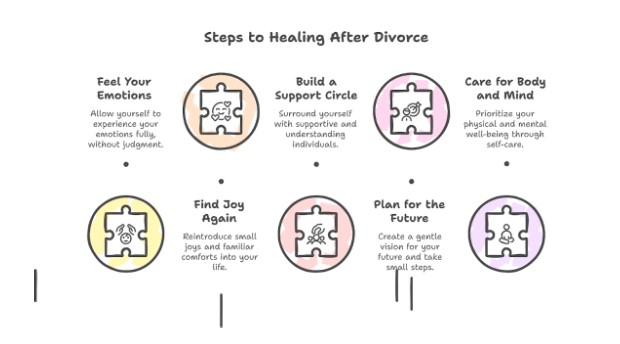
You don’t have to be strong every minute. Maybe today you’re angry. Yesterday, you were numb. Tomorrow might bring tears—or a strange sense of relief you didn’t expect.
Whatever you’re feeling right now, it’s valid. There’s no “right” way to grieve a divorce. There’s just your way.
Too often, we rush to fix, to distract, to pretend we’re fine. But real healing begins when you stop running from the emotions and give yourself space to feel them fully—even when they’re messy, even when they hurt.
Try this:
- Talk to a trusted friend or therapist who can provide a non-judgmental space.
- Journal your emotions—even if it’s just a few angry or honest lines.
- Take walks to clear your mind and let your feelings move through your body.
- Cry when you need to. Laugh when you can. Breathe through the rest.
Letting yourself feel is not a setback—it’s the first real step toward healing.
2- Find Joy Again—One Small Step at a Time
In the middle of heartache, joy can feel far away—like something reserved for someone else, in another life.
But it’s still there, quietly waiting for you.
Not in grand gestures or dramatic changes, but in the small, familiar things that once made you feel like you.
Before the stress, before the arguments, before the silence—there were pieces of your life that brought you comfort, laughter, creativity, peace.
Ideas to try:
- Join a painting or pottery class in Evanston, even if you haven’t touched a brush in years.
- Cook your favorite childhood meals from scratch—just for you.
- Walk the lakefront with a playlist that lifts your spirit or makes you cry in a good way.
- Pull out an old journal, revisit an old hobby, rewatch a favorite movie from before everything changed.
You don’t need to reclaim all of yourself in one day.
Just choose one small thing that reminds you: I’m still here. And that’s enough to begin.
3. Build a Support Circle That Uplifts You
After divorce, some friendships fade—not out of cruelty, but out of discomfort or distance. It’s painful, but also revealing.
You start to see who’s truly in your corner, and you’re given the space to invite in new, life-giving connections.
You don’t need a huge social circle. You just need people who see you, listen without judgment, and remind you that you’re not alone.
Even one steady voice in the dark can help you find your way forward.
Where to find support:
- Join a local divorce support group (many meet weekly in libraries or community centers)
- Explore faith-based or secular groups at nearby churches or synagogues
- Try online forums or apps designed for emotional recovery and life transitions
- Tell trusted friends exactly how they can help—“Can you check in on Sundays?” or “Would you mind walking with me this week?”
For those still processing what happened or struggling to communicate clearly, exploring an emotionally intelligent approach to divorce may help ease tension and promote healthier decision-making.
If you’re ready to get started, call us now!
4. Make a Fresh Plan for the Future
When everything changes, your future may feel like a blank page—and that can be just as frightening as it is freeing.
You don’t have to have it all figured out. You just need a gentle vision for what comes next—and a willingness to take small, meaningful steps toward it.
This is your chance to reimagine life on your terms. Not to rush forward, but to rebuild intentionally.
Start small:
- “I’ll save $25 this month—just for me.”
- “I’ll explore a new hobby this weekend.”
- “I’ll set one career goal to focus on over the next three months.”
- “I’ll make a list of what I want my life to feel like next year.”
You don’t have to leap—you just have to move forward, one quiet step at a time.
When you’re ready to start thinking practically, this Illinois divorce checklist can help organize your next steps without overwhelm.
5. Care for Your Body and Mind
Divorce doesn’t just affect your emotions—it wears on your body, your sleep, your appetite, your energy.
In the swirl of paperwork and parenting and pain, it’s easy to forget that your well-being matters, too.
Self-care isn’t indulgent. It’s essential. Especially now.
Ways to care for yourself:
- Take a 15-minute walk each day—no pressure, just movement.
- Eat regular meals, even if simple—your body needs nourishment to heal.
- Try a calming nighttime routine: warm tea, dim lights, no screens.
- Explore free meditation or breathing apps (Insight Timer, Calm, or even YouTube).
You deserve to feel grounded in your own body again. Healing starts there.
6. Get a Handle on Your Finances
For many, money becomes one of the most daunting aspects of life after divorce. Whether you’re managing a household solo for the first time or rebuilding credit, taking control—even in small ways—can restore a deep sense of power.
For help managing money and rebuilding confidence, this article on financial planning after divorce in Illinois offers practical, judgment-free advice.
You’re not expected to know it all. You’re just expected to begin.
Simple financial steps:
- Create a basic monthly budget using pen and paper or an app like Mint or YNAB.
- Track every dollar spent for one week, just to get clarity.
- Open a separate savings account, even if you start with just $10.
- Consider exploring financial literacy programs offered by your local library, YWCA, or community college.
Each choice you make adds up. Confidence grows with every dollar you reclaim.
Have questions about parenting plans, support, or next steps after your divorce? We offer experienced, judgment-free legal support to help you protect what matters most. Schedule a confidential consultation today.
If you’re ready to get started, call us now!
7. Try Something Social—Even If It’s Small
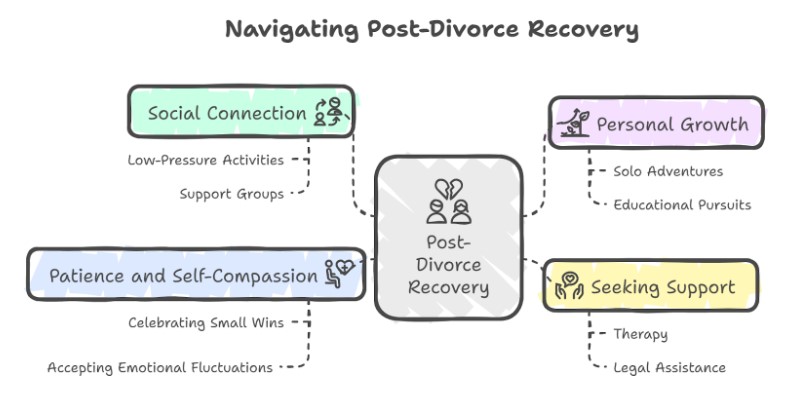
After divorce, socializing can feel awkward, intimidating, or just… exhausting. You may not feel ready to be around people, and that’s okay.
But connection, even in tiny doses, helps re-anchor you to life outside the pain.
You don’t have to put on a brave face. Just show up where kindness might find you.
Start with low-pressure options:
- Meet a friend for coffee and permit yourself to be honest.
- Volunteer at a local food pantry or shelter—sometimes helping others brings healing to ourselves.
- Join a casual walking group through your community center.
- Attend a book club, even if you don’t talk much at first.
- Explore Bumble BFF or Meetup to find a connection without dating pressure.
You might also consider joining a local support group or community meetup—places where others are navigating similar life shifts and can relate to your experience.
You don’t need to be the life of the party. Just being seen, heard, and welcomed can remind you that you still belong.
8. Say Yes to Personal Growth
This wasn’t the chapter you expected. But within the loss, there’s space—space to rediscover who you are, what excites you, and where you want to go from here.
You’re not rebuilding the old version of yourself. You’re becoming something deeper, wiser, more you.
If you’re unsure where to start, consider divorce mediation as a more collaborative and less stressful path to resolution and closure.
Stretch yourself gently:
- Take a weekend trip to a nearby city, just to prove you can.
- Enroll in that class you’ve always talked about but never made time for.
- Try something solo: dinner out, a movie, a museum—no explanations, no pressure.
Every time you choose growth over fear, you remind yourself: I am not stuck. I am still growing.
9. Ask for Help When You Need It
You’re carrying a lot. And some days, it may feel like too much. You are not weak for needing help—you are wise for reaching out.
Divorce is one of life’s most disorienting experiences. No one expects you to navigate it without support.
Types of support that help:
- Individual therapy to process grief, anger, or fear in a safe space.
- Group therapy for shared experiences that reduce isolation.
- Sliding scale counseling services for affordable care (check with local clinics, churches, or the YWCA).
- Peer support apps, such as Circles or Supportiv.
Sometimes, emotional recovery is tied to lingering legal concerns. If you’re navigating parenting time, support modifications, or ongoing conflict, a family law attorney who understands both legal and emotional impact can make all the difference.
The strength isn’t in doing it alone. It’s in saying, *“I can’t do this alone anymore”—*and finding someone who says, “You don’t have to.”
10. Be Patient with Your Journey
Healing isn’t linear. It doesn’t show up with a calendar or a finish line. Some days will feel light. Some will feel like the very beginning again.
You are allowed to take your time. You are allowed to cry on the good days and laugh on the hard ones. Grief is unpredictable—but so is resilience.
Celebrate small wins:
- You got out of bed, even when it felt impossible.
- You laughed—really laughed—with your kids, a friend, or alone at a show.
- You made it through a day that once felt unimaginable.
There is no deadline for becoming whole again. You’re doing it already—step by step, breath by breath.
Final Thought
Divorce is one of life’s hardest resets. It can shake your sense of self, your plans, and your day-to-day life. But it doesn’t mean you’re starting from nothing—it means you’re starting from experience.
This next chapter doesn’t have to be rushed or perfect. It just needs to be yours.
Whether you’re rebuilding in Oak Lawn, figuring things out in Naperville, or just trying to get through the week anywhere in Chicagoland, support is out there—and so is a version of life that feels steady again.
When you’re ready to rebuild, it’s helpful to have someone who understands the legal landscape and prioritizes your family’s needs. The team at Cooper Trachtenberg Law Group brings decades of experience to life after divorce in Illinois and is here when you’re ready.
When you’re ready to rebuild, it’s helpful to have someone who understands the legal landscape and prioritizes your family’s needs. The team at Cooper Trachtenberg Law Group brings decades of family law experience to every case—and we’re just a phone call away.
Contact Us Today For An Appointment
Frequently Asked Questions
What should I do first after a divorce?
Begin by prioritizing your emotional and physical well-being. Let yourself feel, talk to someone you trust, and create a simple daily routine. Small acts of care—such as eating regular meals or going for a walk—can make a significant difference in the early days.
How long does it take to recover from divorce?
There’s no exact timeline. For some, healing may take months. For others, years. It depends on your circumstances, support system, and readiness to process the grief. Be patient with yourself—there’s no “right” pace.
How do I help my children cope with the divorce?
Children need reassurance, stability, and a safe space to express their emotions. Keep routines as consistent as possible, be honest in age-appropriate ways, and let them know they’re not to blame. Co-parenting peacefully, when possible, can also support their adjustment.
Where can I find divorce support groups in the Chicagoland?
Local libraries, churches, and community centers often host divorce support groups. You can also find private therapy practices offering group sessions. Online platforms, such as DivorceCare, Meetup, and Facebook groups, offer virtual and in-person options tailored to the Chicago area.
I feel isolated after my divorce—how can I make new connections?
It’s common to feel lonely after a separation. Try low-pressure social options, such as joining a walking group, volunteering, attending a workshop, or using friendship-focused apps like Bumble BFF or Meetup. Rebuilding your social circle takes time, but it will happen.
How can I rebuild my finances after a divorce?
Start by creating a basic monthly budget, tracking expenses, and opening a savings account in your name. Explore local financial literacy programs offered by the YWCA, libraries, or community colleges in Chicago. A few small wins can help restore your confidence and independence.


